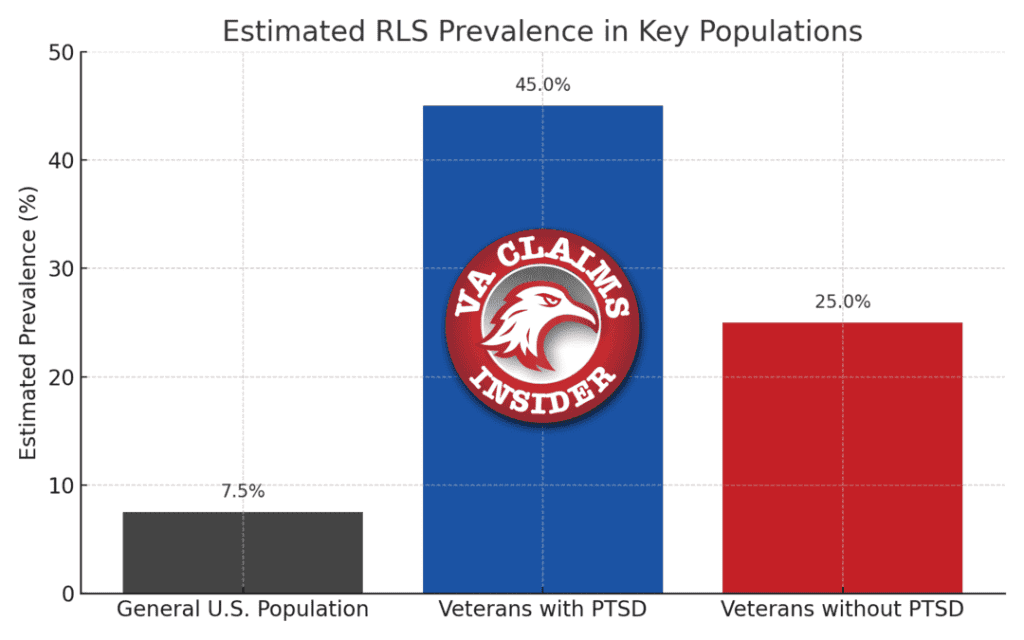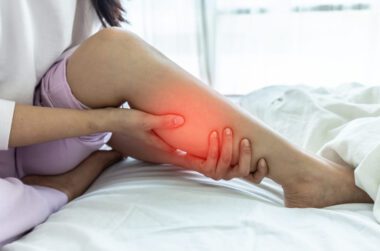Looking for Expert-Level VA Claim Answers?📱Call Us Now! 737-295-2226
Restless Leg Syndrome (RLS) is a neurological condition characterized by uncomfortable sensations in the legs, often resulting in an uncontrollable urge to move them, particularly at night.
The VA assigns restless leg syndrome VA ratings to eligible veterans if they have a current diagnosis and medical evidence linking the condition to their military service or a service-connected disability.
This post covers how the VA rates restless leg syndrome, how to prove service connection, and how secondary conditions like PTSD or sleep apnea are linked to RLS.
Table of Contents
Summary of Key Points
- The VA evaluates restless legs syndrome based on the peripheral nerves affected, using the appropriate neuropathy rating criteria.
- A VA disability rating for restless leg syndrome depends on the severity of symptoms, including how often they occur, how much they interfere with sleep or daily activities, and whether they impact mobility or overall quality of life.
- RLS can be secondary to service-connected conditions like PTSD or sleep apnea, and veterans may qualify for a VA rating if a medical professional provides evidence linking the two.
Is Restless Leg Syndrome a Disability?
Yes, restless leg syndrome can be considered a VA disability if it significantly impacts your daily functioning, particularly in terms of sleep and quality of life.
You may be awarded an RLS VA rating if it’s service-connected or linked to another qualifying condition, such as a mental health issue or neurological disorder.
Causes of Restless Leg Syndrome in Veterans
Restless legs syndrome affects 5% to 15% of the population and can be caused by factors like iron deficiency, kidney disease, neuropathy, or certain medications.
Additional causes of RLS include:
- Neurological conditions
- Chronic illnesses (i.e., diabetes)
- PTSD
- Mental health disorders
- Sleep disruption
- Prolonged stress
Many veterans with a VA rating for restless leg syndrome also experience periodic limb movement disorder (PLMD), though the reverse isn’t always true.
PLMD causes involuntary limb jerking during sleep, while RLS involves uncomfortable sensations while awake and asleep.
How the VA Rates Restless Leg Syndrome
There is no specific VA rating for restless leg syndrome. Instead, the VA evaluates it by analogy under the appropriate peripheral neuropathy code, such as (DC) 8620, which relates to neuritis of the sciatic nerve.
RLS is rated per leg, and ratings range from mild to severe, as follows:
- Mild – 10%
- Moderate – 20%
- Moderately Severe – 40%
- Severe – 60%
Since there is no definitive test for RLS, your VA rating will be based heavily on medical evidence and the impact of your symptoms on daily life.
Proving Service Connection for RLS
To qualify for a VA restless leg syndrome rating, you must prove the following:
- A current medical diagnosis of restless leg syndrome
- An in-service event, injury, or illness that could have caused or contributed to your condition
- A medical nexus linking your current condition to your military service (can be a nexus letter)
How to File a VA Claim for Restless Leg Syndrome
You can file for VA disability:
- By mail
- Via fax
- In-person at a VA regional office near you
If you choose a method other than online, you’ll need to download and complete VA Form 21-526EZ.
Insider Insight: After you file your VA claim, the VA may schedule a compensation & pension (C&P) exam if they need more information to decide your claim. It’s vital you don’t miss this appointment; otherwise, your claim could move forward without key medical evidence.
What to Expect at Your RLS C&P Exam
If the VA schedules a C&P exam for restless leg syndrome, the examiner will ask about your symptoms, how often they occur, and how they affect your sleep and daily life.
Your answers help the VA determine the severity of your condition, so be honest, specific, and clear.
See More: Learn more about the RLS C&P exam and how to prepare
DBQ for Restless Leg Syndrome
A Disability Benefits Questionnaire (DBQ) for RLS can help support your VA claim by providing detailed medical evidence about your condition.
The DBQ should be completed by a licensed medical professional and include information such as symptom frequency, severity, how RLS affects your sleep and daily activities, and any related conditions like sleep apnea or PTSD.
Although there isn’t a VA-issued DBQ specific to RLS, doctors often use the Peripheral Nerves Conditions DBQ (VA Form 21-0960C-10) to document symptoms.
Pro Tip: Submitting a well-supported DBQ can strengthen your case and improve your chances of receiving an accurate VA rating.
Restless Leg Syndrome as a Secondary Condition
Restless leg syndrome doesn’t always occur on its own; it can develop because of another service-connected condition.
If you’re already rated for a primary condition and begin to show symptoms of RLS, you may be eligible for additional VA disability compensation through a secondary service connection.
Restless Leg Syndrome Secondary to PTSD
Veterans with PTSD often experience sleep disturbances, anxiety, and hyperarousal, factors that may trigger or worsen RLS.

A 2018 study of Vietnam veterans published in the Journal of Clinical Sleep Medicine found that 45% of those with PTSD reported symptoms of restless legs, compared to only 25% of those without PTSD.
If you’re already service-connected for PTSD or another mental health condition and experience symptoms like insomnia, leg discomfort, or sleep-related movement, you may qualify for a secondary service connection for RLS.
Restless Leg Syndrome Secondary to Sleep Apnea
RLS may also be connected to other service-connected conditions like sleep apnea.
If one condition causes or aggravates the other, you can file a secondary claim, but you’ll need a current diagnosis and a medical opinion (nexus letter) clearly linking the two.
Getting properly evaluated for RLS can improve treatment and potentially support a higher combined VA rating, especially if sleep issues are already documented in your medical history.
Did you know?
If you’re filing a secondary VA claim for restless leg syndrome (whether linked to PTSD, sleep apnea, or another condition), you’ll likely need a nexus letter to prove the connection. A strong, well-written nexus letter from a licensed medical professional can make the difference between approval and denial.
Conclusion
The VA may rate restless leg syndrome if it’s linked to your military service or a service-connected condition like PTSD or sleep apnea. Ratings fall under peripheral neuropathy criteria, such as diagnostic code 8620, and are based on the severity of symptoms for each leg.
To qualify, you must have a current medical diagnosis, proof of service connection, and a medical nexus that links your condition to service.
Understanding how the VA rates restless leg syndrome can help you maximize your VA disability compensation and benefits.
(FAQs) Frequently Asked Questions
What is the VA rating for restless leg syndrome?
There’s no specific diagnostic code for RLS, so the VA typically rates it by analogy under DC 8620 for sciatic nerve neuritis, with ratings ranging from 10% to 60% depending on severity.
Can I get a restless leg syndrome VA rating caused by tinnitus?
While rare, it may be possible to claim a restless leg syndrome VA rating caused by tinnitus if a medical professional can establish a clear connection between the two. You will need strong medical evidence showing that your tinnitus contributes to sleep disruption or neurological symptoms that trigger or worsen restless leg syndrome.
Is restless leg syndrome rated per leg?
Yes. Each leg is evaluated separately, and your overall compensation may reflect whether one or both legs are affected.
Can mental health conditions like PTSD cause RLS?
Yes. Studies show that veterans with PTSD have higher rates of RLS, and the condition may be rated secondary if properly linked by medical evidence.
What medical proof do I need for a restless leg syndrome VA claim?
You’ll need a current diagnosis, medical records showing symptom severity, and a nexus (e.g., a nexus letter) linking RLS to your service or a service-connected condition.
Want Expert-Level Support for Your VA Disability Claim? WE GOT YOUR SIX!
- VA Claims Insider is the #1 most trusted name in VA disability claims.
- Work directly with a VA claims coach who can educate you to VA claim victory.
- 25,000+ disabled veterans have served in our membership programs since 2016.
- 30% average rating increase for veterans who complete our #1-rated Elite program.
- 4.7/5.0 average rating out of 5,500+ total reviews; over 4,500 5-star reviews.
Author

Kelly Olone
Kelly Olone is a military spouse who earned her degree in Psychology from Florida International University. After working in the non-profit sector for several years, she turned to her passion for writing. She aims to contribute to a better understanding of the valuable benefits that veterans deserve. As a mom, Kelly navigates the delicate balance between deadlines and bedtime stories with finesse.



